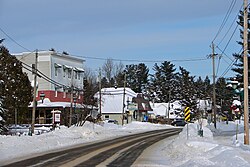Nominingue
Municipality in Quebec, Canada From Wikipedia, the free encyclopedia
Municipality in Quebec, Canada From Wikipedia, the free encyclopedia
Nominingue is a small village and municipality located 200 kilometres (120 mi) north of Montreal, Quebec, Canada, in the Laurentian Mountains. It was formerly called Lac-Nominingue, but changed name on September 16, 2000.
Nominingue | |
|---|---|
 | |
 Location within Antoine-Labelle RCM | |
| Coordinates: 46°24′N 75°02′W[1] | |
| Country | Canada |
| Province | Quebec |
| Region | Laurentides |
| RCM | Antoine-Labelle |
| Settled | 1883 |
| Constituted | October 30, 1971 |
| Government | |
| • Mayor | Francine Létourneau |
| • Federal riding | Laurentides—Labelle |
| • Prov. riding | Labelle |
| Area | |
• Total | 360.86 km2 (139.33 sq mi) |
| • Land | 303.89 km2 (117.33 sq mi) |
| Population (2021)[3] | |
• Total | 2,255 |
| • Density | 7.4/km2 (19/sq mi) |
| • Pop. (2016-21) | |
| • Dwellings | 1,937 |
| Time zone | UTC−5 (EST) |
| • Summer (DST) | UTC−4 (EDT) |
| Postal code(s) | |
| Area code | 819 |
| Highways | |
| Website | www |
Nominingue is located along Route 117, between Mont-Laurier and Rivière-Rouge, and is near the International Airport of Rivière-Rouge/Mont-Tremblant.
It is surrounded by dozens of lakes, including Petit and Grand Lac Nominingue, Lac des Grandes Baies, and Lac Sainte-Marie, as well as a forest. It is near Papineau-Labelle Wildlife Reserve and Rouge-Matawin Wildlife Reserve. The village was established in the late 1880s by pioneers sent by Curé Labelle to develop this mountainous and wild region. It was once the last station of the famous "P'tit train du Nord" (Little train of the North), until it was extended to Mont-Laurier in 1909. The former Canadian Pacific Railway station in Nominingue is now a small museum and rest stop for cyclists. Golf, disc golf, biking, fishing, and hunting are among the most popular outdoor activities.
The name Nominingue comes from an Algonquin word meaning "vermilion" or "red ochre", referring to a variety of red chalk found in the area.[1]
In March 1883, the first settlers arrived from Montreal. By the following year, its first sawmill and flour mill was in operation.[4] And in 1884, the parish of Saint-Ignace-de-Loyola-de-Nominingue was established, served by Jesuits until 1891. In 1887, its post office opened under the name Nominingue.[1]
On September 15, 1904, the Village Municipality of Nominingue was formed by separating from the Township Municipality of Loranger.[5] This township was created on June 15, 1896, out of unorganized area,[6] and named after Louis-Onésime Loranger.[1]
The Municipality of Loranger-Partie-Sud-Est was founded on April 29, 1920, when it split off from the Township of Loranger. It was renamed the following year to Lacaille, after its first mayor, then in 1931 to Bellerive, and renamed again in 1962 to Bellerive-sur-le-Lac.[1][7]
The Municipality of Lac-Nominingue was formed on October 30, 1971, through the amalgamation of the Village Municipality of Nominingue, the Township Municipality of Loranger, and the Municipality of Bellerive-sur-le-Lac. On September 16, 2000, it was renamed to Nominingue since there no longer was a Lake Nominingue (this lake was renamed shortly before to Grand lac Nominingue).[1][8]
From Grand Lac Nominingue, in the northeast of the municipality, the Nominingue River flows southeast. The Petite-Nation River crosses the center of the municipality from north to south. The Preston River crosses the southeastern tip of the municipality towards the southwest. The Saguay River crosses the municipality from the north to the southeast until its mouth in Petit Lac Nominingue.
| 2021 | 2016 | 2011 | |
|---|---|---|---|
| Population | 2,255 (+5.5% from 2016) | 2,137 (+5.8% from 2011) | 2,019 (-12.9% from 2006) |
| Land area | 303.89 km2 (117.33 sq mi) | 307.48 km2 (118.72 sq mi) | 306.22 km2 (118.23 sq mi) |
| Population density | 7.4/km2 (19/sq mi) | 7.0/km2 (18/sq mi) | 6.6/km2 (17/sq mi) |
| Median age | 61.6 (M: 62.4, F: 61.2) | 58.3 (M: 59.2, F: 57.3) | 53.6 (M: 54.6, F: 52.5) |
| Private dwellings | 1,937 (total) 1,176 (occupied) | 1,937 (total) | 1,952 (total) |
| Median household income | $56,800 | $47,232 | $44,519 |
|
| ||||||||||||||||||||||||||||||||||||
| Source: Statistics Canada | |||||||||||||||||||||||||||||||||||||
Mother tongue (2021):[3]

List of former mayors:
Seamless Wikipedia browsing. On steroids.
Every time you click a link to Wikipedia, Wiktionary or Wikiquote in your browser's search results, it will show the modern Wikiwand interface.
Wikiwand extension is a five stars, simple, with minimum permission required to keep your browsing private, safe and transparent.